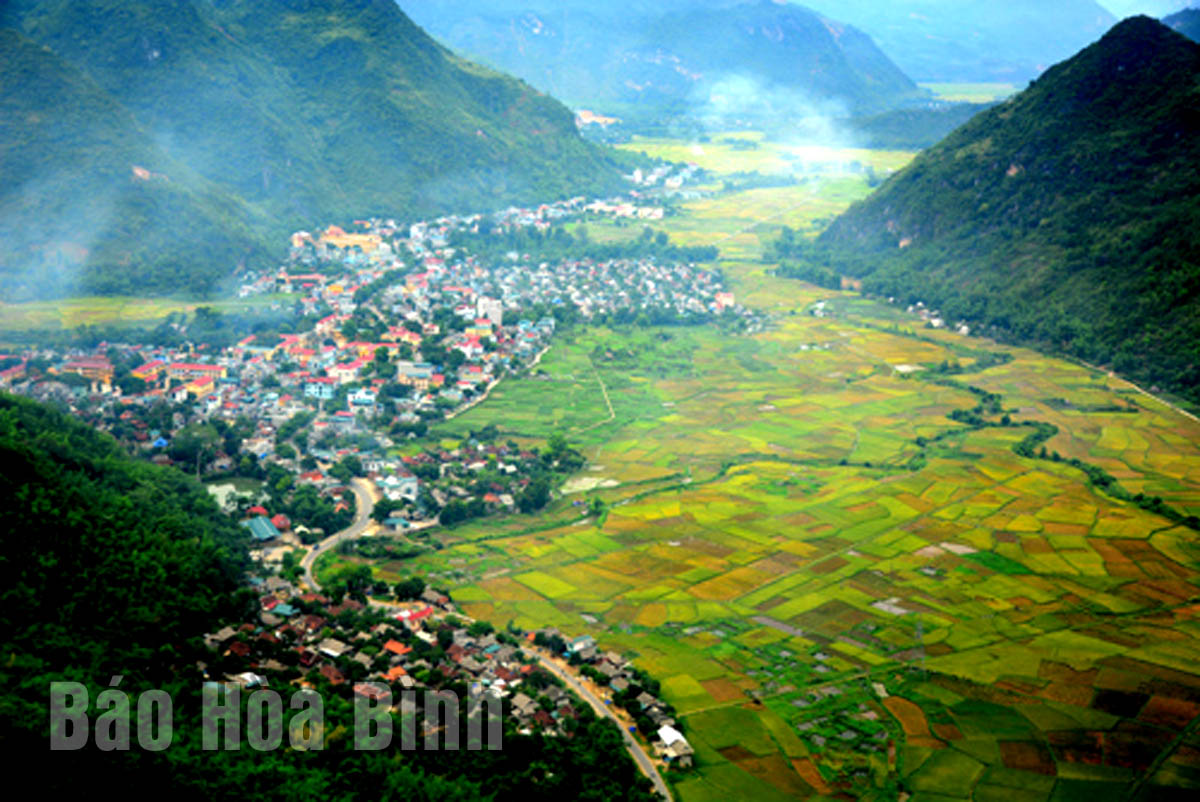
(HBO) - The Standing Board of the provincial Party Committee has just issued Resolution No. 20-NQ/TU orienting the development of Mai Chau township into a four-tier urban area to 2030.
Mai Chau township in the district of the same name will become a four-tier urban area by 2030.
The target will be realised on the basis of promoting existing potentials and strengths. The locality will preserve and promote cultural values while restructuring the economy towards increasing the proportion of trade - services and industry – construction. Agriculture will be developed in the direction of biotechnology, high quality and added value so as to turn Mai Chau township into a centre of tourism and service development of the province.
To achieve sustainable economic development, Mai Chau township will invest in building modern and synchronous infrastructure; reasonable labour structure, diversifying jobs, contributing to improving the people's material and spiritual life as well as ensuring national defence – security. The locality will build a strong political system, a contingent of cadres and civil servants with firm political spirit, professional skills and management capacity which meet the requirements of tasks in the new situation.
Implementing the resolution, from 2023 - 2025, the province will assist Mai Chau district in completing a project on adjustment and expansion of the general planning with a scale of 1/5000 for Mai Chau township by 2030, with a vision to 2040. The locality will effectively exploit available strengths, focusing on meeting criteria and standards of a four-tier urban area, especially building and upgrading the technical infrastructure network. From 2026 – 2030, attention will be paid to expanding the urban area to the north, south and southwest; developing new urban areas as well as completing technical and social infrastructure. It strives to be recognised as a four-tier urban area by 2030.
The total investment capital to realise the target is about 1.1 trillion VND (46.2 million USD). This sum of capital mainly comes from the provincial budget and mobilises from non-state budget sources.
Hoa Binh province is undergoing a dynamic transformation amid Vietnam’s national digital transition. Building on Poliburo’s Resolution No. 57-NQ/TW on breakthroughs in science, technology, innovation, and national digital transformation, the province has rolled out a wide range of practical action plans. A standout initiative is the "Digital Literacy for All” movement, an effort to ensure that no one is left behind in the digital era.
Hoa Binh province is undergoing a dynamic transformation in the wake of the national digital transformation movement. Building on Resolution No. 57-NQ/TW of the Politburo on breakthroughs in science, technology, innovation, and national digital transformation, the province has implemented a wide range of practical action plans. A standout initiative is the "Digital Literacy for All” movement ambitious effort to ensure that no one is left behind in the digital age.
With a spirit of unity and proactive problem-solving, the Party Committee, the government and the people of Dong Lai Commune (Tan Lac District) have made great strides in implementing the resolutions of the 24th Party Congress of the commune for the 2020 - 2025 term. Focusing on leadership and practical actions, the commune has brought the Party’s resolutions into daily life, creating strong impacts and pushing the local development forward.
Amid the nationwide push for digital transformation, young people in Hoa Binh Province are stepping up as dynamic pioneers, applying technology to enhance Youth Union operations and expand the reach of youth-led initiatives. Through creativity and adaptability, Youth Union organizations at all levels have introduced a series of practical solutions, contributing to modern governance and community development.
In recent years, An Nghia commune, located in Lac Son district, has stepped up administrative reform, focusing on improving the quality and efficiency of its single-window service unit for receiving and processing administrative procedures. These improvements have helped create favourable conditions for local residents and organisations to handle administrative procedures, contributing to the commune’s broader socio-economic development.
The Prime Minister-approved master plan to develop the multi-use value of forests ecosystems through 2030, with a vision to 2050, aims to improve the management and sustainable use of forest resources, create jobs, increase incomes, and improve the living standards of ethnic minorities, people in mountainous and remote areas, forest workers and those living near forests.



